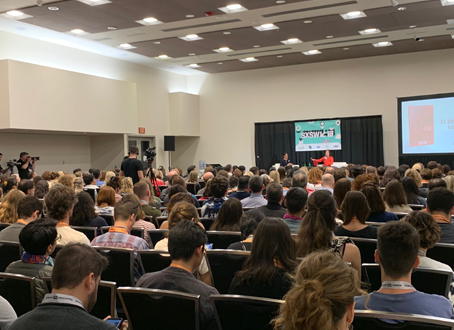The Myth of the “E Word” is the sixth post in the Case Foundation’s Myth of the Entrepreneur series. This series is intended to intentionally examine, and change, the stories our culture tells about entrepreneurship. For more information on the Case Foundation’s approach to the Myth series and Inclusive Entrepreneurship, please check out our introductory piece. We encourage you to join the conversation using #Ent4All on Twitter.
*Special thanks to Calvin Millien, intern with the Case Foundation, for his contributions to this blog.
Our Myth of the Entrepreneur series has taken a hard look at how the mythology of entrepreneurship and the media portrayal of entrepreneurs have created an archetype and “face” of an entrepreneur that are so exclusive that they become barriers to diversifying entrepreneurship, both demographically—particularly women and entrepreneurs of color—and geographically—beyond Silicon Valley.
So far, we’ve explored the Myths of Isolation, Combat, Failure and STEM-only, and tried to bust the myths that may be marginalizing entire classes of entrepreneurs our society needs to help grow our economy and strengthen our communities. And over the past year, as I’ve engaged with women and entrepreneurs of color, I’ve had this nagging thought—what if the term “entrepreneur” itself is a barrier to both expanding and diversifying entrepreneurship? I hypothesize that the Silicon Valley entrepreneur stereotype that has become the go-to brand for entrepreneurs makes it harder for non-male, non-white, non-Silicon Valley based, non-technology based founders to self-identify as “entrepreneurs.”
I’ve accumulated plenty of anecdotal data that suggests that women in particular don’t self-identify as “entrepreneurs” as comfortably and confidently as men do, even when they have a much clearer idea of the problem they are solving for. “Well, I’m no Bill Gates,” is a common refrain. Or “Well, I didn’t invent Snapchat, I’m just running a café that employs at-risk youth.” Women have even come right out and written pieces like, “I’m Not a Real Entrepreneur,” which detail the ways they don’t fit into this stereotypical cultural mold, including how being a woman—especially a woman with children—excludes them from the category.
And then there’s the quantitative research: women are 2x less likely to perceive themselves as able to be entrepreneurs and hold themselves to a stricter standard of competence when compared to similarly situated men. This gender gap in self-assessment explains in part the gender gap in entrepreneurship.
Babson College has identified a multitude of factors that are affecting women’s entrepreneurship, but the codification of this vision of the successful male entrepreneur is a significant hurdle for women. Candida Brush states in Forbes:
“The male-gendering of entrepreneurship has been portrayed in the popular media for decades and even in academic case materials, where the protagonists of entrepreneurship cases are almost always male. The perpetuation of this gender stereotype means that because women do not fit the gender stereotype for ‘entrepreneur’ they face higher hurdles in starting, growing and sustaining their ventures.”
Look, It’s pretty easy to see why it might be hard for the word entrepreneur to feel inclusive. Google “top 10 entrepreneurs.” Here’s your image:

As human beings, we respond to the messages we receive from the world around us about who should take risks, who should assert themselves, who should lead. You can’t be what you can’t see, and so we need to break the mold, rewrite the narrative, Lean In, and change the face of the entrepreneur.
It just might be that intention to be inclusive in entrepreneurship may well be hindered by the exclusionary power of the word “entrepreneurship” itself. So, the impending question becomes, what is an alternative title? We’ve been throwing around a few here: Founder, Maker, Hustler. And then there are the more traditional roles that may bring a wider group to the table: CEO, Small-Business Owner.
Or maybe as Noah Kagan of AppSumo recommends, “instead of calling yourself an entrepreneur, focus on what you actually help people do” and let that be your “title.”
Are you an “entrepreneur” or someone who does the job but doesn’t feel the title? Share your ideas on alternates to the “e-word” and join the conversation at #Ent4All!






